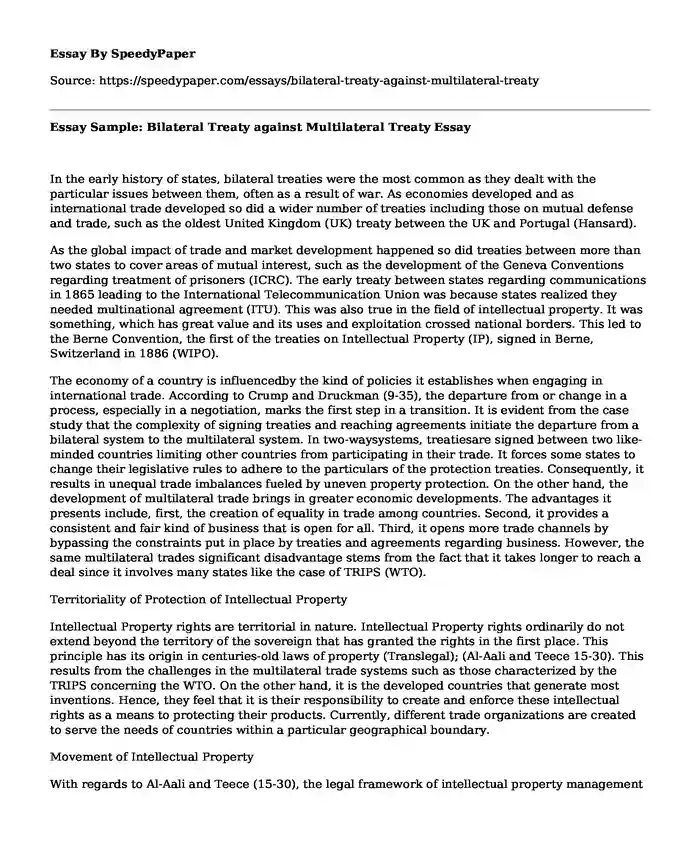In the early history of states, bilateral treaties were the most common as they dealt with the particular issues between them, often as a result of war. As economies developed and as international trade developed so did a wider number of treaties including those on mutual defense and trade, such as the oldest United Kingdom (UK) treaty between the UK and Portugal (Hansard).
As the global impact of trade and market development happened so did treaties between more than two states to cover areas of mutual interest, such as the development of the Geneva Conventions regarding treatment of prisoners (ICRC). The early treaty between states regarding communications in 1865 leading to the International Telecommunication Union was because states realized they needed multinational agreement (ITU). This was also true in the field of intellectual property. It was something, which has great value and its uses and exploitation crossed national borders. This led to the Berne Convention, the first of the treaties on Intellectual Property (IP), signed in Berne, Switzerland in 1886 (WIPO).
The economy of a country is influencedby the kind of policies it establishes when engaging in international trade. According to Crump and Druckman (9-35), the departure from or change in a process, especially in a negotiation, marks the first step in a transition. It is evident from the case study that the complexity of signing treaties and reaching agreements initiate the departure from a bilateral system to the multilateral system. In two-waysystems, treatiesare signed between two like-minded countries limiting other countries from participating in their trade. It forces some states to change their legislative rules to adhere to the particulars of the protection treaties. Consequently, it results in unequal trade imbalances fueled by uneven property protection. On the other hand, the development of multilateral trade brings in greater economic developments. The advantages it presents include, first, the creation of equality in trade among countries. Second, it provides a consistent and fair kind of business that is open for all. Third, it opens more trade channels by bypassing the constraints put in place by treaties and agreements regarding business. However, the same multilateral trades significant disadvantage stems from the fact that it takes longer to reach a deal since it involves many states like the case of TRIPS (WTO).
Territoriality of Protection of Intellectual Property
Intellectual Property rights are territorial in nature. Intellectual Property rights ordinarily do not extend beyond the territory of the sovereign that has granted the rights in the first place. This principle has its origin in centuries-old laws of property (Translegal); (Al-Aali and Teece 15-30). This results from the challenges in the multilateral trade systems such as those characterized by the TRIPS concerning the WTO. On the other hand, it is the developed countries that generate most inventions. Hence, they feel that it is their responsibility to create and enforce these intellectual rights as a means to protecting their products. Currently, different trade organizations are created to serve the needs of countries within a particular geographical boundary.
Movement of Intellectual Property
With regards to Al-Aali and Teece (15-30), the legal framework of intellectual property management is changing, driven by the current changes in the global economy, which includes the inventions in technology. From the initial Bilateral Phase, the Paris Convention of 1883 and Berne Convention of 1886 as part of the BIRPI Phase marked significant phases with regards to the step-wise movement towards the creation of the international legal framework. The legal statutes enacted with the respective conventions led to the multilateral application phenomenon in the TRIPS Phase where participants from the member countries were accorded a similar treatment. The approach has been relatively the same but more comprehensive. The Paris and Berne Conventions are still in force but the phase movement can be described through subsequent revisions that followed, especially the Uruguay Round and the Paradigmatic Phase. As a result, countries that were not initially members get an opportunity to join the treaty. Such a strategic approach of revising the original treaties shows how IPs international legal framework moves from one phase to another.
References
Al-Aali, Abdulrahman Y. and David J. Teece. "Towards The (Strategic) Management Of Intellectual Property". California Management Review 55.4 (2013): 15-30. Web. 27 Oct. 2016.
Crump, Larry and Daniel Druckman. "Turning Points In Multilateral Trade Negotiations On Intellectual Property 1". International Negotiation 17.1 (2012): 9-35. Web. 27 Oct. 2016.
Hansard,. "Agreement With Portugal (Hansard, 12 October 1943)". Hansard.millbanksystems.com. N.p., 2016. Web. 27 Oct. 2016.
ICRC,. "Updated Commentaries Bring Fresh Insights On Continued Relevance Of Geneva Conventions". International Committee of the Red Cross. N.p., 2016. Web. 27 Oct. 2016.
ITU,. "History". ITU. N.p., 2016. Web. 27 Oct. 2016.
Translegal,. "Choice Of Law In International Intellectual Property Disputes (2) - Translegal". TransLegal. N.p., 2016. Web. 27 Oct. 2016.
WIPO,. "Summary Of The Berne Convention For The Protection Of Literary And Artistic Works (1886)". Wipo.int. N.p., 2016. Web. 27 Oct. 2016.
WTO,. TRIPS: Agreement on Trade-Related Aspects of Intellectual Property Rights. N.p., 2016. Web. 27 Oct. 2016.
Cite this page
Essay Sample: Bilateral Treaty against Multilateral Treaty. (2019, Nov 28). Retrieved from https://speedypaper.com/essays/bilateral-treaty-against-multilateral-treaty
Request Removal
If you are the original author of this essay and no longer wish to have it published on the SpeedyPaper website, please click below to request its removal:
- Making Good Choices Essay Samples
- Essay Sample on Financial Governance in Healthcare and Nursing Management
- Essay Sample for You: Classroom Behavior Management
- Essay Sample on Manual Repositioning Strategies
- Essay Example on the Two Escobars' Influence on Columbian Soccer
- Free Essay: The Effects of Methylphenidate on Female and Male Fertility
- Free Essay Example. Organizations Obstacles
Popular categories





